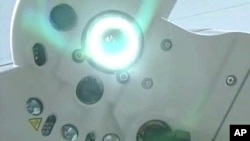LASIK eye surgery is used to correct people's vision and end their need for glasses or contact lenses. The U.S. Food and Drug Administration approved the procedure 15 years ago. But now, a former government regulator is publicly expressing concerns about the procedure's safety.
A review of LASIK studies worldwide shows that 95 percent of those who have had LASIK surgery are happy with the results.
With LASIK, doctors use a laser to permanently change the shape of the cornea to improve vision. The U.S. military considers Lasik so safe, the procedure is often performed on troops about to be deployed.
But some people who have undergone LASIK are left with permanently damaged vision. They see double, or have problems seeing at night or see starbursts or halos around lights. Some people have lost their jobs and can no longer perform basic functions, such as driving due to bad outcomes from LASIK.
Abby Ellin is one of the people not satisfied with the outcome of her LASIK procedure. "I was not a success because I had dry eyes and halos and everything else. That is not a success," she explained.
Now, the man who headed the office responsible for reviewing the data on LASIK at the Food and Drug Administration says those side effects were not taken seriously enough. Morris Waxler is no longer with the agency.
"It's right there in the record, the agencies and the refractive surgeons," said Waxler. "People know these problems occur and there doesn't seem to be a plan to handle some of the more difficult problems that are created."
Waxler says the agency should have provided better oversight and employed tougher standards for dealing with adverse effects of LASIK. The agency is now investigating patient reports of LASIK injuries and is working on a study of post-LASIK problems.
In addition, the agency requires the makers of machinery used in LASIK to meet certain standards before the agency will approve any new lasers used in this surgery.
In the meantime, Morris Waxler has advice for those thinking about having LASIK.
"Read everything you can. There's no urgency to do it. So make sure you understand the worst that can happen to your eyes and you can live with the worst," added Waxler.
Dr. Penny Asbell, a doctor who performs the procedure, says people should be aware that not everyone is a good candidate for the surgery.
"Sometimes I think instead of asking how many LASIK procedures you have done, you should actually ask the doctor, how many have you turned away," noted Dr. Asbell.
The Food and Drug Administration does not regulate the practice of medicine in the U.S. It regulates the lasers used in the procedure.




